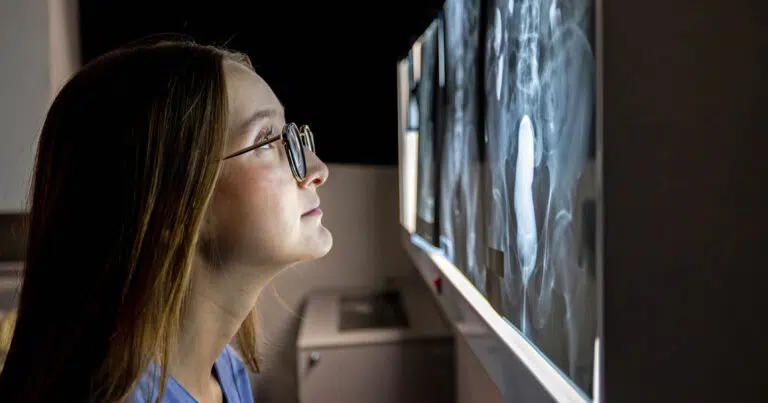X-Ray Technician Salary Guide
X-ray technicians, also known as radiology technicians, specialize in obtaining radiographic images of patients’ bones, organs and soft tissue. These images help doctors diagnose, treat and monitor injuries and illnesses.
Before imaging, X-ray technicians meet with patients to explain the procedure, answer questions and review relevant medical history. Then, they safely position the patient and equipment and take all the requested images. Technicians may also consult with the ordering physician to determine if the images are clear and complete enough for their intended purpose or if additional X-rays are necessary. X-ray technicians maintain equipment and order supplies as needed.
How do you become an X-ray technician?
How do you become an X-ray technician?
To become an X-ray technician, you typically need an associate’s degree in radiologic technology from an accredited university. Most programs include both academic study and clinical practice, with coursework focusing on anatomy, pathology, X-ray evaluation, patient care, and radiation physics and safety.
Many states require X-ray technicians to be licensed and/or certified. Facilities often prefer licensed candidates, regardless of state law. Some employers may also favor X-ray technicians who hold a bachelor’s degree in a healthcare-related field.
What credentials/licensing does an X-ray technician require?
Licensure and credentialing requirements for X-ray technicians vary by state. However, many states require radiographic specialists to be certified through the American Registry of Radiologic Technologists (ARRT), earning the Radiology Registered Technologist credential. To receive certification, candidates must have a degree from an AART-approved university, meet strict ethical requirements and pass a comprehensive examination.
X-ray technicians also may become Certified Radiology Equipment Specialists through the Association for the Advancement of Medical Instrumentation. Technicians may qualify for additional certifications as they gain work experience.
Licensing rules vary by state, and some areas may require technicians to receive continuing education in radiation safety and other relevant topics. For state-specific licensing laws, contact your state’s board of health.
Average X-Ray Technician Salary
$30.34/hour
The average salary for a X-Ray Technician is $30.34 per hour. This is 27% lower than the practicing US average of $38.41.
Estimate based on Bureau of Labor Statistics data.
Salaries for X-Ray Technician compared to Allied Health Professional National Averages
$30.34/hour
27% lower than the practicing US average.
$38.41/hour
United States

X-Ray Technician Career Guide
Use our exclusive Career Guides to research the education, qualifications, skills and responsibilities for a variety of healthcare disciplines and specialties employers are hiring now.
Go to the guideGet alerts about new jobs and salary trends
Be the first to know about new jobs for X-Ray Technicians with the salary that suits you.
How can you increase your pay as an X-ray technician?
An X-ray technician’s salary typically increases with years on the job. However, you can bring home additional pay regardless of experience level by:
Adding certifications: Specialty certifications from ARRT, such as Cardiac-Interventional Radiography RT, can often add dollars to your paycheck.
Completing a bachelor’s degree: Although X-ray technicians usually only need an associate’s degree, many facilities prefer candidates with advanced education and may pay accordingly.
How does X-ray technician pay compare to similar healthcare jobs?
On Vivian, an X-ray technician's average salary was about 26% lower than the national mean for allied health professionals overall on April 1, 2023. By comparison, the average hourly wage for MRI technologists was $53.18, a difference of more than $20. On average, travel MRI technologists earned $2,554 per week, compared to $2,262 earned by short-term X-ray technicians, a less substantial difference. Rather than specializing in X-rays, MRI specialists perform scans using magnetic resonance imaging technology. However, they have similar educational requirements and may find employment at the same types of facilities.
How much does a staff X-ray technician make?
As an X-ray technician, your salary can vary widely depending on your experience level, the facility and the region. However, according to Vivian Health's salary data, as of late March 2023, the average salary for technicians in staff positions was $30.34 per hour, with pay ranging from $18 to $38.
Is X-ray technician a growing career?
Like many other healthcare positions, the demand for X-ray technicians continues to rise as America’s aging population increases the need for medical services. The Bureau of Labor Statistics (BLS) anticipates a 6% job growth for X-ray technicians and other radiologic professionals between 2021 and 2031. That translates to about 16,000 open positions each year for professionals in this field, including X-ray technicians and MRI technologists. Besides newly created positions, openings may include jobs vacated by retirees and workers changing occupations.
What types of employers/facilities have the most X-ray technicians employed?
X-ray technicians and other radiologic technologists find employment in various medical settings. However, according to BLS data, as of May 2021, state, local or private hospitals employed approximately 58% of these healthcare professionals. Doctors’ offices had about 19% of qualified X-ray techs on staff. A smaller percentage of technicians and technologists work at outpatient care centers and diagnostic or medical laboratories. The federal government also employs a few X-ray technicians.
Which employers/facilities have the highest pay?
Wages for X-ray technicians vary by employer and facility type. Although the federal government accounts for only a small percentage of all radiologic technicians, they typically offer the highest pay, with technicians earning a median annual wage of $71,530, according to BLS data from May 2021. Outpatient care centers and medical/diagnostic laboratories also offer competitive pay, with median salaries at $67,240 and $62,410, respectively. Pay at private and state hospitals falls slightly below that, with a median paycheck of $61,670, while technicians employed at doctors’ offices receive about $59,500.
Featured Blog Posts
Featured Blog Posts


